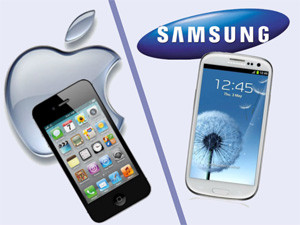
As the smartphone market continues to explode globally, a new report says Samsung will hold on to and grow its market-leading position, while Apple's market share is expected to remain flat for the next five years.
This is according to figures from ABI Research's latest Mobile Handset Markets Database. The research firm projects that smartphones will account for 50% of all mobile phone shipments by 2014. This figure is expected to reach 69% of all handset shipments (an estimated total of 2.4 billion) by 2018.
The research company notes that Samsung grew its market share from 8%, in 2010, to 30%, in 2012, and it is still rising, while it expects Apple to peak at 22% this year.
ABI senior analyst Michael Morgan says: "Barring an unlikely collapse in Samsung's business, even Apple will be chasing Samsung's technology, software, and device leadership in 2013 through the foreseeable future.
"While Samsung's rise has been on the back of Android, which accounts for 90% of Samsung's smartphone shipments, the future smartphone OS landscape will likely be heavily influenced by the importance Samsung places on the elements of its OS portfolio of Bada, Tizen, Windows Phone, and Android," adds the research firm.
Low-cost challenge
Other figures from the database show LTE handsets are projected to account for 35% of all handset shipments and 50% of smartphone shipments by 2018. ABI says LTE will be the fastest growing wireless wide area network technology in history, but smartphone penetration over the next few years will be driven primarily by the growth of the low-cost smartphone segment.
The report states that by 2018, smartphones with wholesale average sales prices below $250 will account for 62% of smartphone shipments.
Last week, rumours of a low-cost iPhone were fuelled by a Wall Street Journal report that claimed Apple has been working on such a device for some time now and could release it during the course of the year. This suggestion was quashed by Apple's chief of marketing, Phil Schiller, who emphasised that so-called "cheap phones" would never be part of the company's strategy and that it would instead focus on serving its select target market.
Former Apple CEO John Sculley recently commented in an interview with Bloomberg that he believes Apple is not doing enough to adapt its products to emerging markets, which will be essential for the company's growth given the saturation of developed markets such as the US and Europe.
Share